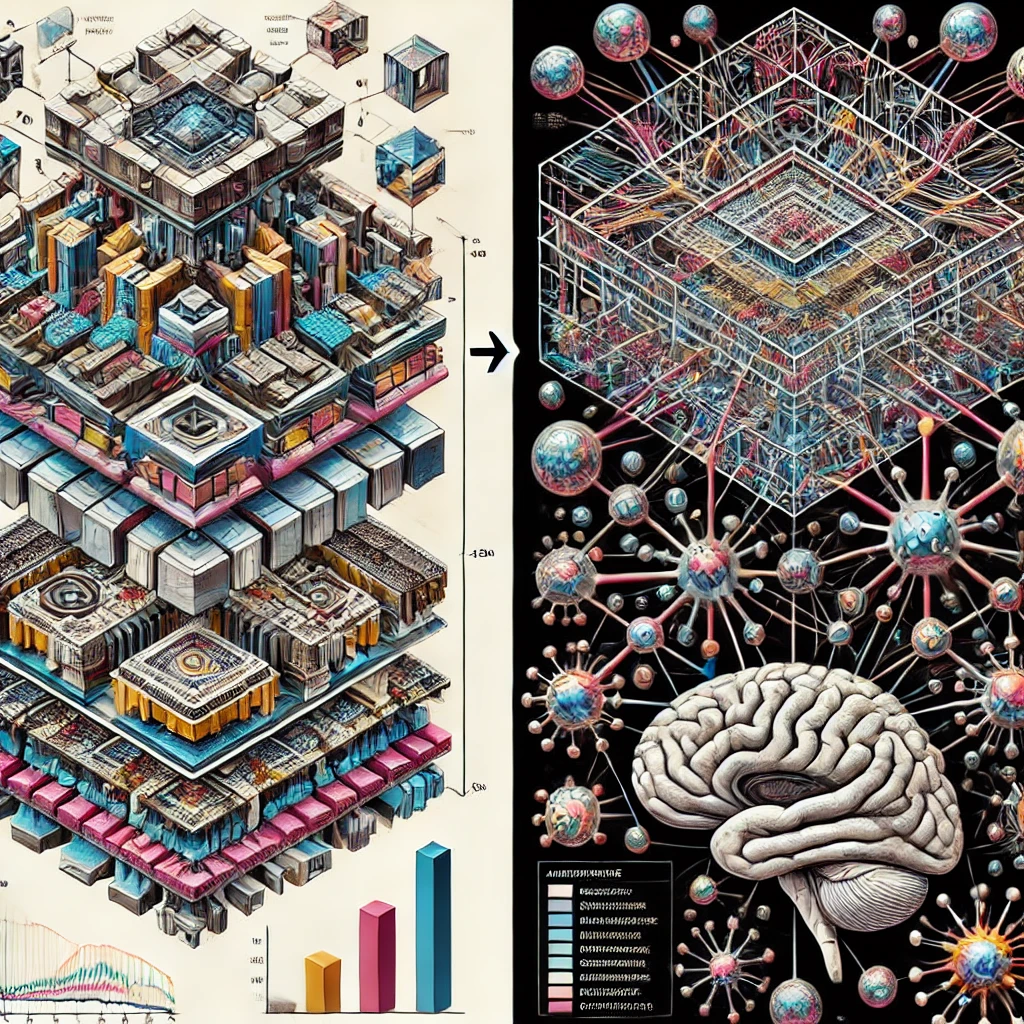
From Nanotechnology to AI: Riding the Wave of the Quantum Revolution
| August 29, 2024
“How did you transition from engineering (Chemical and Material Science) to AI?” This question often comes up when I share my journey. Let me take you back to where it all began. My career path has always been fueled by a deep sense of curiosity. I have always had a need to understand how things work, to peel back the layers and see what lies beneath. This curiosity led me to grad school, where I studied computational material science, specializing in the fascinating world of nanotechnology.
As I delved deeper into nanotechnology, my academic foundation, rooted in quantum physics, exposed me to a world where the smallest elements govern the largest outcomes. I explored reality at the atomic level, where the rules of classical physics give way to the intricate world of quantum mechanics. My work focused on understanding how quantum interactions impact the properties of everyday materials.
To predict these atomic interactions, I leveraged high-performance computing to simulate and predict these atomic interactions. In this realm, computational power and algorithms weren’t just tools—they were the very lens through which I viewed and manipulated reality. Little did I know that this experience would become the perfect springboard into the world of artificial intelligence.
Bridging Worlds: From Atoms to Algorithms
Surprisingly, the leap from nanotechnology to AI wasn’t as big as you might think. Both fields share a core similarity: using immense computational power and sophisticated algorithms to create something new. In nanotechnology, we designed novel materials with specific properties. In AI, we develop intelligent systems capable of learning and decision-making.
Standing at the intersection of nanotechnology, quantum physics, and AI, I am amazed by the journey that brought me here. This path has given me a unique view on how algorithms, coupled with computational power can reshape our world. Nowhere is this power more evident than in the rapidly evolving field of quantum computing.
The Quantum Leap: More Than Just Faster Computers
As I transitioned from nanotechnology to AI, I realized that the leap wasn’t as large as you might think. In both fields, we use immense computational power and sophisticated algorithms to design and create something new. The only difference is the end product: in nanotechnology, it’s novel materials; in AI, it’s intelligent systems capable of learning and making decisions.
But there is a technology on the horizon that promises to revolutionize both fields: quantum computing.
Quantum Computing: The Industrial Revolution 4.0
Quantum computing is not just another technological advancement; it is the driving force behind what many are calling the Fourth Industrial Revolution. By fundamentally altering how we process information, quantum computing is poised to reshape entire industries, driving innovation at an unprecedented pace.
Let’s explore how this fascinating technology is reshaping key industries:
Pharmaceuticals: Accelerating the Path from Lab to Lifesaving
In the pharmaceutical industry, quantum computing is a game-changer. Traditional drug discovery is notoriously slow and expensive, often taking over a decade and billions of dollars to bring a new drug to market. However, quantum computers have the potential to revolutionize this process.
Imagine simulating complex molecular interactions in a fraction of the time it takes today. This is what quantum computers, like those developed by IBM and Google, promise to deliver. They can simulate molecular interactions at an unprecedented scale and speed.
My background in high-performance computing (HPC) for molecular simulations gives me insight into the immense computational power needed for these intricate processes. The jump to quantum computing, combined with capabilities of HPC centers like the Texas Advanced Computing Center (TACC), could dramatically speed up new treatment development.
We are looking at a future where we might develop vaccines for new pandemics in weeks rather than years. Moreover, we could create targeted cancer treatments tailored to specific genetic makeups. The impact is profound: faster development of lifesaving treatments, personalized for individual patients, and delivered more cost-effectively. This transformation promises to reshape healthcare as we know it.
Energy: Powering a Sustainable Future
As we tackle climate change, quantum computing emerges as a beacon of hope for the energy sector. By enabling precise modeling of complex systems, quantum computers could revolutionize how we generate, store, and distribute energy.
Traditional methods of material discovery are time-consuming and costly, often relying on trial and error. However, with quantum computing, we can explore material behavior at the atomic level with unprecedented accuracy. This capability could lead to breakthroughs in energy efficiency, battery technology, and renewable energy sources.
Furthermore, quantum algorithms could transform energy grid management. They could enable real-time optimization of supply and demand, significantly reducing waste and enhancing renewable resource utilization. This technology offers the potential to uncover entirely new methods of sustainably powering our world, ensuring a brighter future for generations to come.
Automotive: Driving Innovation on the Quantum Highway
The automotive industry stands on the brink of a quantum leap. Quantum computing promises to revolutionize everything from vehicle design to traffic management. By applying quantum algorithms, automakers can explore new possibilities, pushing the boundaries of vehicle performance and safety.
In the design phase, for instance, quantum computing can simulate and optimize aerodynamics with unmatched precision. This means more fuel-efficient vehicles, reduced emissions, and the ability to explore innovative designs previously out of reach.
However, the most transformative impact might be in the development of autonomous vehicles. Quantum algorithms could significantly enhance the decision-making capabilities of self-driving cars. They can process vast amounts of sensor data in real-time, far more efficiently than today’s systems. This could enable autonomous vehicles to navigate complex environments with greater accuracy and reliability, improving safety and reducing accidents.
Beyond individual vehicles, quantum computing could optimize traffic flow in smart cities. It could create transportation systems that are not only more efficient but also more responsive to real-time conditions. By analyzing traffic patterns and predicting congestion before it happens, quantum-powered systems could help reduce commute times, lower fuel consumption, and minimize transportation’s environmental impact.
Finance: Quantum-Powered Portfolios and Fraud Detection
In the world of finance, quantum computing is set to be a game-changer. From portfolio optimization to risk analysis and fraud detection, the ability to process vast amounts of data and run complex simulations in real-time could revolutionize money management.
Envision an AI-powered financial advisor, supported by quantum computing technology. Such an advisor could analyze global market trends, assess risk factors, and optimize your investment portfolio in real-time with unprecedented precision. This isn’t just a future possibility—Microsoft’s Azure Quantum platform is already laying the groundwork for making these capabilities accessible to financial institutions worldwide.
In banking cybersecurity, quantum algorithms could be transformative. Companies like D-Wave and IonQ are exploring how quantum computing can detect fraudulent activities faster and with greater accuracy than ever before. This could reshape how we secure financial transactions, making our financial systems more robust and trustworthy.
The Road Ahead: Challenges and Opportunities
While the potential of quantum computing is enormous, it’s important to note that we’re still in the early stages of this technology. Quantum computers face several hurdles. For instance, they’re incredibly sensitive to environmental factors, making them prone to errors. Developing stable qubits and error-correction techniques remains a significant challenge.
Moreover, we are still learning how to create quantum algorithms that outperform classical algorithms for practical applications. It is a bit like having a supercar but still figuring out how to drive it effectively.
However, these challenges present exciting opportunities. This is where you come in. As we stand on the brink of this quantum revolution, there’s an unprecedented chance for innovation and entrepreneurship. Whether you are a scientist, an engineer, a business leader, or simply someone fascinated by cutting-edge technology, there is a role for you in shaping this quantum future.
Preparing for the Quantum Future
So, how can you prepare for this quantum future? Here are a few actionable steps:
- Stay informed: Keep up with the latest developments in quantum computing. Follow reputable science and technology news sources, and consider subscribing to quantum computing newsletters.
- Explore potential applications: Think about how quantum computing could impact your industry or field of interest. What problems could it solve? What new opportunities could it create?
- Invest in education: Consider taking online courses or attending workshops on quantum computing. Even if you’re not planning to become a quantum physicist, having a basic understanding of the principles can be invaluable.
- Foster interdisciplinary thinking: Quantum computing sits at the intersection of physics, computer science, mathematics, and engineering. Cultivating a broad, interdisciplinary perspective can help you see new connections and opportunities.
- Engage in ethical discussions: As with any powerful new technology, quantum computing raises important ethical questions. Engage in discussions about its potential impacts on society, privacy, and security.
Embracing the Quantum Revolution
The quantum computing revolution is just beginning, and its full impact is yet to be realized. However, one thing is clear: quantum computing has the potential to reshape industries, solve previously intractable problems, and open up new frontiers of innovation.
As we stand on the brink of this new era, the question isn’t whether quantum computing will change the world, but how we will harness its power to create a better future. The quantum frontier is wide open, full of possibilities waiting to be explored.
From my journey that began in nanotechnology and led me to AI, I’ve seen firsthand how computational advances can transform scientific discovery. Now, with quantum computing, we’re poised for an even greater leap. The future of quantum AI and quantum technology in industries promises to redefine what’s possible in fields ranging from drug discovery to financial modeling, from material science to climate change mitigation.
Are you ready to take the leap into this quantum future? The revolution is here, and it’s up to us to shape it. Whether you’re a researcher, an entrepreneur, or simply a curious mind, there’s a place for you in this quantum saga. Let’s ride this wave of innovation together and see where the quantum computing revolution takes us.
Remember, the future isn’t just something that happens to us—it’s something we create. And with quantum computing, we have a powerful new tool to shape that future. The quantum era is dawning. Are you ready to be part of it?
Recent Blogs
View All
The AI Research Consortium Revolution
| November 11, 2025

The University AI Commercialization Gap
| August 15, 2025

Scaling Intelligence: Quantum Bits to Global Networks
| August 29, 2024

The Future of Shopping is Now
| July 25, 2024

Navigating the Future of AI and Society
| July 24, 2024

I just like the helpful information you provide in your articles
Very well presented. Every quote was awesome and thanks for sharing the content. Keep sharing and keep motivating others.